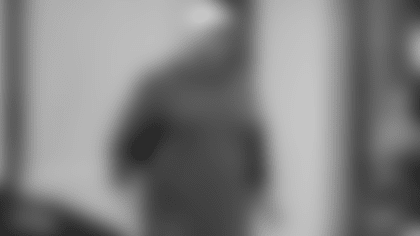Chargers.com is chatting with every Bolts assistant coach this offseason. Up next? Phil Serchia
Welcome home, Phil. You grew up just up the road in Thousand Oaks. How does it feel being back in SoCal?
"From a perspective of my friends, family, guys I haven't seen in five or six years reaching back out and being able to reconnect with them, it is awesome. From that standpoint, it's great to be back. Hometown team, followed them from when I was little. To be able to work with them is awesome."
Family-wise, how has the move been?
"We had a real smooth transition. Luckily, we came at the right time where we had a couple weeks off to be able to help with that. Found a place right away, was able to move right away, so the family came pretty much the same time I did, they weren't having to stay back at Hutch [Hutchinson Community College in Kansas] for a while. We were able to sell the house fast in Hutch, it was a real smooth transition."
A fun nugget here. You and I went to the same high school (Thousand Oaks) and were teammates on the track and field team for one season. I remember you as a dominant athlete. How do you look back on your time at TOHS?
"Obviously very involved with sports. Football-wise, we were very successful. Wrestling I really enjoyed, we had a really good team for most of my years. Individually, my senior year we had a blast there. Then track, throwing the shot put and discus. We did well as a team I think my sophomore, junior and senior year there. My teammates, my team was real fun, met a lot of different circles. Wrestling circle is real close, football was football and track was track so to be able to see a lot of the different sets, being able to get along with everybody."
Did your wrestling background help you as an offensive lineman?
"I loved it, I think it translates tremendously. I think from high school to college, there's a lot of merit to it of understanding your base, your angles, your feet, the hand fighting both run and pass. I think it really helped my game a lot going to the next level. I think you see a lot of basketball players because of the footwork of it, wrestling is the same kind of way."

Take me through your journey through college.
"I actually went to Wyoming for a year. Had a fun experience there, met my wife there. Didn't know what I wanted to do, bounced around a couple of majors my first two years then left there after a full year then went to Ventura [College] for two seasons. Then went to Colorado State, played there for two. Then I was a Graduate Assistant for different staffs and then coaching."
What are your core principles as a coach?
"Being able to work with multiple guys, learning different techniques, working for different staffs. Obviously my O-line coach in high school, I've gone from Wyoming to Ventura, then to Colorado State. Even at Colorado State, I worked with three different O-line coaches as a player. Then as a GA, a different O-line coach. You kind of just piece it together but as a core value, not even just in the football aspect, like a family feel, family atmosphere because once you get that you're competing with each other and working together as a unit. You see that with the O-line, we're the tightest unit primarily but working together to achieve a common goal is more than X's and O's, more than development. The camaraderie you get once you get that, then things start working together."
What did you learn from your time at Hutch?
"The nice thing about that level is it is a developmental league so to speak. Your goal is to develop players both on and off the field. For whatever reason, people have to go to junior college whether they were under-recruited or need help academically. Nowadays a lot of it is because they're taking a lot of portal guys, the high school recruits suffer a little bit. To help with more exposure, there's a lot of Kansas kids we had that just were under-recruited so to speak. Maybe it's guys that might have the physical makeup but need a little bit more developing that colleges are like 'I don't know, but we like him'. You work in a system a year, six months, two years, three years sometimes and seeing that transition from those guys, that buy in to see the level they can get to. We had some good players, very successful run there and the resources at Hutch separate itself even from a junior college-wise. The alumni that has been through Hutch, it means something to the Hutch guys. It's not just a JuCo. It's like I brought up earlier, it's a family. Hutch is family. Doesn't matter if you were there in 2010 when Coach Staley was there, they really had to grind and recruit when they only had 12 out of staters till now where you have 55 out of staters. That family aspect for sure."

What is your role now with the Chargers?
"A lot of it is I'm working with the O-line. Work with the O-line, do a lot of drawings, pretty much whatever [offensive line] Coach [Brendan Nugent] and [assistant offensive line] coach Shaun [Sarrett] need off their plate. Breakdowns, run drawings, protection drawings and then working with the guys on the field."
What do you enjoy about working with Nugent and Sarrett?
"Coach [Nugent] worked for my O-line coach that I worked with and played for at Colorado State, his name was Pat Meyer. After Colorado State, Pat went to Montreal, the Bears then the Bills, then here with the Chargers and then Carolina and now he's with Pittsburgh. I've known [Nugent] for a while. Shaun, I met here and from the minute I talked to Shaun on the phone when this thing was a chance, it was an instant connection. I knew he was a good dude, obviously he's been around the NFL for a while. Just learning from him, learning from [Nugent], different techniques, new techniques, new things. Then it's good to get on the front ground with Kellen [Moore] of coming in Year 1 of learning as we're all bridging stuff together. It's been fun."
What have your early interactions with Kellen been like?
"My first interaction with him was when I told him — obviously he's a Boise State guy — at the time they were still in the WAC and we were in Mountain West. Well they came into the Mountain West his senior year, and when I was on the phone with Kellen was I had to tell him the story. It was his senior year, they were stacked. He handed the ball off to Jay Ajayi and he took it for like 90 [yards] against us. But yeah, I've known of him, followed him since his Boise days. Never knew him or anything like that, but great guy, unbelievable mind, sharp, great to work with and collaborative."

How do you look at the Chargers O-line group?
"With any O-line group, the camaraderie, the togetherness, the willing to work to do the new techniques and not stuck in, 'This is the way we're doing it'. It's a collaborative effort of 'Hey, let's try something new this time of year in the offseason.' We're kind of experimenting on things, different techniques that we like and being able to see those translate into OTAs and training camp to see how that goes. But great group of guys."
What got you prepared for the NFL?
"I've always wanted it. I knew pretty early on, even at Colorado State, there's not many 6-foot centers out there in the NFL. I knew ball was going to be done, but I knew I was going to get into coaching. I think my teammates are the one that kind of pushed me that way of, 'You got a good mind for it, you understand it schematically and technique-wise.' Because as an undersized lineman, I had to play with a lot more technique. I didn't have God-given length, strength or whatever. You had to be a little smart, you had to be a technician of things. I think that ultimately got me to like, 'Hey, I kind of like doing this, talking it and engraining in it.' I always knew I wanted to be an NFL coach. Coaching small ball and JuCo ... keep grinding and finding your path, finding your way and the way you want to do things. Ultimately, I got an opportunity to be up here."
















